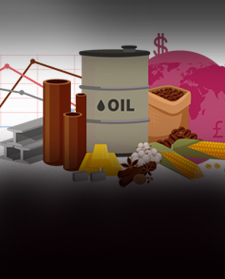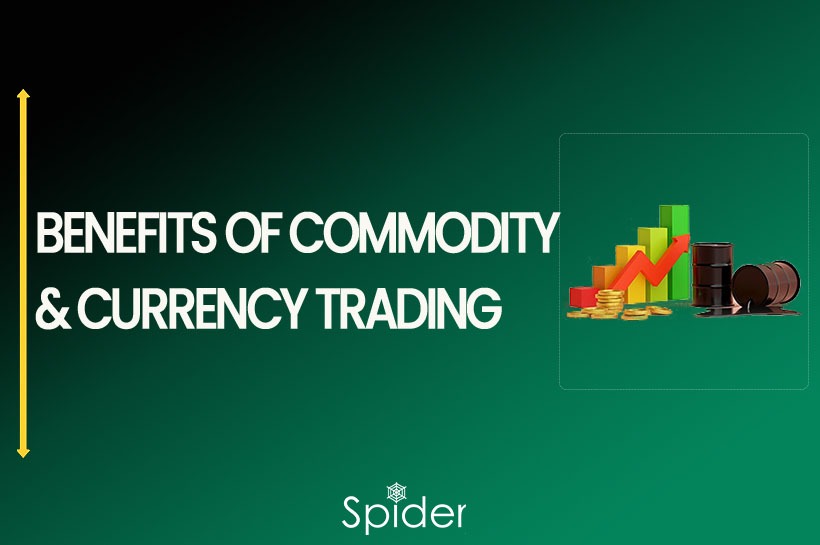Commodity trading involves the buying and selling of commodities. It is the process of exchanging one currency for another with the aim of making a profit from changes in exchange rates.
What is Commodity and Currency Trading?

Commodity trading involves the buying and selling of commodities, which are raw materials or primary products that are generally interchangeable with other goods of the same type. These commodities can include agricultural products like wheat, corn, soybeans, cotton, coffee, and livestock, as well as natural resources like crude oil, natural gas, metals (gold, silver, copper), and minerals. Commodity trading can take place in various forms such as physical trading, futures contracts, options contracts, and exchange-traded funds (ETFs).
Currency trading, also known as foreign exchange (forex) trading, involves the buying and selling of currencies. It is the process of exchanging one currency for another with the aim of making a profit from changes in exchange rates. Currency trading is typically conducted in the global decentralized foreign exchange market, which operates 24 hours a day, five days a week. Traders in the forex market speculate on the value of one currency against another, taking advantage of fluctuations in exchange rates to generate profits. Various financial institutions, brokers, or online platforms facilitate currency trading.
How to trade in Commodities?
Commodity trade options contracts refer to the rights to buy (call option) or sell (put option) the underlying commodity futures at predetermined prices on the contract expiration date. It’s important to note that commodity options trading differs from equity options trading, where investors have the right to buy or sell company shares at predetermined prices.
In India, the regulations for options trading on commodities are specific. Most market regulators in India, such as the Securities and Exchange Board of India (SEBI), only permit options trading on the commodity futures market and not the commodity spot market. This distinction exists because the spot or cash market in commodities is regulated by state governments in India, while SEBI oversees the commodity derivatives market.
How do you trade in Currencies?
The global currency market, also known as the forex market, is indeed decentralized. It has evolved to become the largest financial market worldwide, with an average daily trading volume of around $5 trillion. The forex market operates 24 hours a day, five days a week, across different financial centers globally.
Currencies are traded in pairs in the forex market, with one currency being exchanged for another. The most actively traded currency pairs include the US dollar (USD) against other major currencies such as the euro (EUR), British pound (GBP), Japanese yen (JPY), Swiss franc (CHF), and others.
In India, trading in derivative instruments related to currencies is available on Indian exchanges. This includes currency futures and cross-currency futures & options. Currency futures allow traders to buy or sell currency contracts with predetermined contract sizes, expiration dates, and exchange rates. Cross-currency futures & options involve trading between two currencies other than the Indian rupee (INR).
Benefits of Commodity Trading
- Diversification: Commodity trading provides an opportunity to diversify investment portfolios. Commodities have historically shown a low correlation with traditional asset classes like stocks and bonds, which means they can help reduce overall portfolio risk and enhance diversification.
- Inflation Hedge: Commodities, particularly certain types like precious metals and energy resources, have historically acted as a hedge against inflation.
- Potential for Profit: Commodity markets can exhibit significant price volatility, providing opportunities for traders to profit from price fluctuations.
- Risk Management: Businesses exposed to price volatility in raw materials can utilize risk management tools offered by commodities.
- Global Demand and Supply: Factors such as population growth, industrialization, and economic development drive the demand for commodities, making them essential resources consumed globally.
- Access to Different Sectors: Commodity markets cover a wide range of sectors, including agriculture, energy, metals, and more.
- Transparency and Regulation: Commodity markets are subject to regulatory oversight and transparency measures.
- Leverage: Commodity futures contracts often require a relatively small percentage of the contract value as margin, allowing traders to control a larger contract size with a smaller upfront investment.
Benefits of Currency Trading
- High Liquidity: The forex market is the largest financial market globally, with a daily trading volume exceeding $5 trillion.
- 24-Hour Market: Currency trading operates 24 hours a day, five days a week, allowing traders to participate in the market at their convenience.
- Diverse Trading Opportunities: The forex market offers a wide range of currency pairs to trade.
- Volatility and Potential for Profit: Currencies can experience significant price volatility due to various factors such as economic data releases, geopolitical events, and central bank announcements. T
- Leverage: Forex trading allows traders to utilize leverage, which means trading larger positions with a smaller amount of capital.
- Accessibility: Currency trading is accessible to individual retail traders, thanks to advancements in technology and the availability of online trading platforms.
- Global Market Exposure: Currency trading provides exposure to global economies and geopolitical events.
- Risk Management and Hedging: Currency trading allows for risk management and hedging strategies.
If you’d like to know how do we analyze the market and provide accurate levels every day. then click on the Free Demo button below and change your trading life for good. 5X returns is possible in options trading, If you have Spider Software in your trading system.
Also, Check out our article on Why should you trade in BSE Options?
Disclaimer: The information provided in this Blog is for educational purposes only and should not be construed as financial advice. Trading in the stock market involves a significant level of risk and can result in both profits and losses. Spider Software & Team does not guarantee any specific outcome or profit from the use of the information provided in this Blog. It is the sole responsibility of the viewer to evaluate their own financial situation and to make their own decisions regarding any investments or trading strategies based on their individual financial goals, risk tolerance, and investment objectives. Spider Software & Team shall not be liable for any loss or damage, including without limitation any indirect, special, incidental or consequential loss or damage, arising from or in connection with the use of this blog or any information contained herein.





